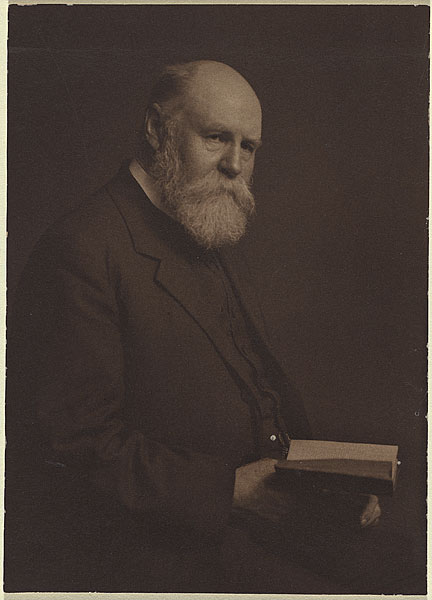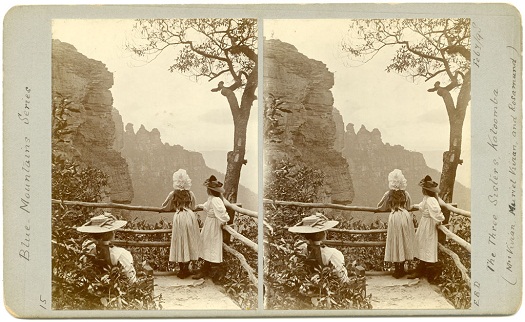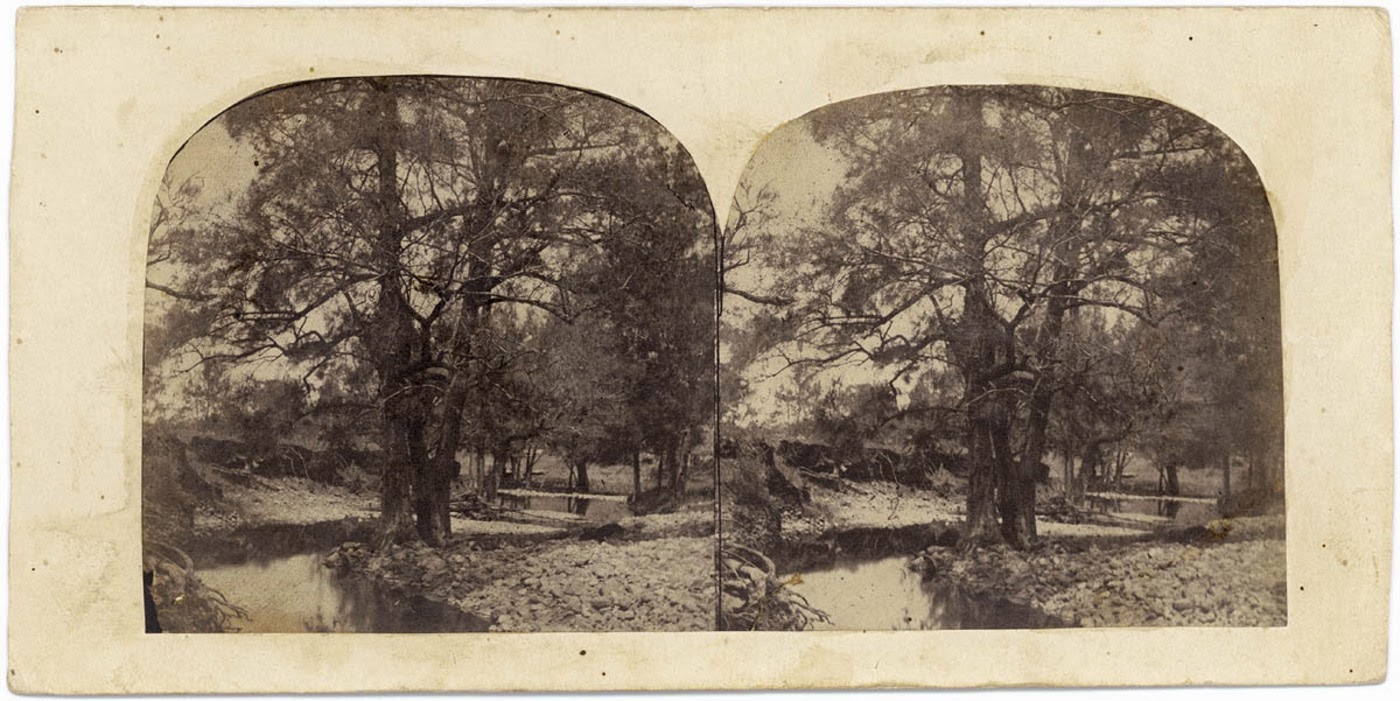ERNEST BROUGHAM DOCKER

DOB - 1st April 1842 - Scone, New South Wales
DOD – 12th August 1923 - Elizabeth Bay, Sydney
The following information is from the Australian Dictionary of Biography, Volume 8, 1981
Ernest Brougham Docker, judge and photographer, was born on 1 April 1842 at Thornwaite, near Scone, New South Wales, the eldest son of Joseph Docker and his second wife Matilda, née Brougham. Educated at the Collegiate School, Cook's River, in 1860 he won the Sir William Denison scholarship to enter St Paul's College, University of Sydney, where he lived up to his early promise, winning the University Medal for English verse in 1861 and the Wentworth medal for an English essay in 1862. He graduated B.A. in 1863 and M.A. in 1865, then turned his attention to the law.
Admitted to the colonial Bar on 28 June 1867, Docker advanced steadily in his profession, becoming crown prosecutor for the northern district in 1875, the south-western district in 1878, and judge of the District Court and chairman of Quarter Sessions for the north-western district in 1881. In 1884-1912 he was in the western district. He was conscientious on the bench, working long hours, arranging his sittings conveniently for suitors, and taking additional courts, often without remuneration. His legal knowledge was sound but his forthright manner, cutting wit and severe sentences upon hardened criminals drew criticism. He was concerned, however, that justice should always be done. He opposed shorthand writers in the court but urged the adoption of English criminal law reforms, changes in the perjury law, and an end to restrictions upon the competency of witnesses to give evidence; he also wanted public prosecutors instead of the police for Crown cases in the lower courts. In 1894 he was appointed to hold a murder trial on Norfolk Island and in 1912 he transferred to the metropolitan District Court. He retired in 1918 after the passage of the Judges Retirement Act.
Docker was a notable amateur photographer. He took lessons from William Hetzer and in 1858, with his father, began experiments with a wet-plate process. Between 1860 and 1868 Docker was sensitizing his own dry plates by the tannin-collodion-albumen process, although dry plates were not widely used until the early 1880s. Joining the Royal Society of New South Wales in 1876, he used his own extensive collection of photographs for many illustrated addresses before it. He did much to promote photography through his articles in overseas and Australian journals, particularly in the British Journal of Photography, and as president of the Photographic Society of New South Wales in 1894-1907.
Docker also devoted much time to the Church of England and was a synodsman for the Sydney and Bathurst dioceses. He was a council-member of The King's School, Parramatta, and a member of the Royal Australian Historical Society. Attracted to literature, he published several volumes of sacred hymns and poems; Henry Kendall praised them and valued Docker's opinions of his own work and the judge's faith in his 'attempts to initiate a purely Australian literature'. A keen sportsman, Docker enjoyed cricket, tennis and duck-shooting and whist or bridge in the evenings. On 25 June 1873 at Wangaratta, Victoria, he had married Clarissa Mary, daughter of Archdeacon J.K. Tucker. She died on 3rd June 1918, the judge at his waterfront home, Mostyn, Elizabeth Bay, on 12th August 1923. He was survived by seven daughters and two sons; the younger son Ernest won the Military Cross in World War I.
Wednesday 1st January 1913 Page 14 - Sydney Mail (NSW)
HIS HONOR AND A CAMERA
His Honor Judge Docker has for 32 years occupied a seat on the Bench of the New South Wales District Court. For 28 years of that period his circuit has been the western district, but the other day he held his last Court in the West and in future his duties will be confined to the metropolitan area. His Honor has long been on enthusiastic amateur photographer. Though seventy years of age, Judge Docker is still youthful. His mental powers are as keen as ever; his erect, well-proportioned figure might be envied by many a man of fifty; and in his genial countenance is the flush of health that is usually associated with well regulated outdoor life. He has had many interesting experiences in the course of his long career as a Judge of the District Court and when in reminiscent mood relates them in entertaining fashion. He was born near Scone, in New South Wales, his father being the late Hon. Joseph Docker M.L.C. and after a distinguished career at Sydney University was admitted to the Bar in 1867. Selecting the northern district in which to practise, he had gone on his first circuit as far as Armidale when he heard that there was a vacancy in the western district. He instantly changed his plans and returned to Sydney, arriving there just too late to enable him to catch the bi-weekly direct mail from Mount Victoria (which at that time was the terminus of the railway) to Forbes, where the Court was to be held. Consequently he was obliged to travel by coach via Cowra and Grenfell, but managed to reach Forbes in good time. His first Court found him with a dozen briefs and so ably did the young barrister handle them that he won every case. His Honor sometimes refers to this as "a lucky beginning", but those who know him and have noted the patience, carefulness and ability that mark his treatment of the cases that come before him for decision, know very well that "luck" was not the only element in that remarkable preliminary success.
Friday 17th August 1923 Page 7 - The Sydney Morning Herald (Sydney NSW)
JUDGE DOCKER
DEATH ANNOUNCED
NOTABLE PERSONALITY
Judge Ernest Brougham Docker, who resigned from the District Court Bench in 1918, after 38 years' service, died at his residence, Mostyn, Elizabeth Bay, yesterday morning. The late Judge Docker, who was in his 82nd year, was a son of the late Mr Joseph Docker, M.L.C., several times Minister of the Crown. Born at Thornthwaite, near Scone NSW, Judge Docker was educated at the Collegiate School, Cook's River and subsequently at the Sydney University, where his career was brilliant. He won the Denison Scholarship at St. Paul's College in 1860. The following year he took the University medal for English verse and in 1862 won the Wentworth medal for English essay. He took his B.A. degree in 1863 and two years later his M.A. degree. Judge Docker was called to the New South Wales Bar in June, 1867 and in 1875 was appointed Crown Prosecutor. He was elevated to the position of Judge of the Metropolitan District Court in 1912. Prior to that he was District Court Judge of the north-western district from 1881 to 1884 and of the western district from 1884 to 1912. In 1894 he was appointed Judge to hold a Court at Norfolk Island. In addition to being a member of the Royal Historical Society and the Royal Society, Judge Docker was a member of the Council of the King's School, of the Church of England Synod of the Sydney diocese and of the Bathurst diocese and was President of the Photographic Society of New South Wales from 1894 to 1907. He was author of "Hymns of the Kingdom," sacred verse, in 1876. Judge Docker is survived by seven daughters and two sons, his wife having pre-deceased him in June, 1918. His daugters are: Mrs Maynard Pain, of Wahroonga; Mrs F. H. Campbell, of Kew, Melbourne; Mrs F. Piddington, Avella, Running Stream, Capertee; and Misses Winifred, Rosamund, Constance and Sylvia Docker; and the sons, Mr Alfred Brougham Docker, of Blairmoor, Richmond (North Queensland) and Dr. Ernest Noel Docker, of Coonabarabran. Mr T.L. Docker, formerly manager of the Commercial Bank at Armidale, Mr A.R. Docker and Miss Docker, who reside in England, are brothers and sister of the late Judge. A service will be held in St. John's Church, Darlinghurst, at 1.30pm today, after which the funeral cortege will proceed to South Head Cemetery.

JUDGE ERNEST BROUGHAM DOCKER
Friday 17th August 1923 Page 7 - The Sydney Morning Herald (Sydney NSW)
LATE JUDGE DOCKER
The funeral of the late Judge Ernest Brougham Docker left St. John's Church, Darlinghurst, for South Head Cemetery yesterday and the large gathering which attended the service at the Church and the graveside testified to the high esteem in which the deceased gentleman was held. The casket, which was removed to the Church in the morning, was surrounded by many floral tributes.
The chief mourners were: Dr. E.N.R. Docker, of Coonabarabran (son); Mrs Maynard Pain, of Wahroonga, Mrs F. Piddington, of Capertee and Misses Winifred, Rosamund and Constance Docker (daughters); Messrs. C.T. Docker, P.W. Docker, K.B. Docker, Ronald Docker and Robert Docker (nephews); Mrs Edward Docker (sister-in-law); and Mrs Mottershead (niece). At the church the service was conducted by Canon Beck (rector of St. John's), Archbishop Wright giving the address. The service at the graveside was conducted by Canon Beck, assisted by Archdeacon Davies, of Moore College. Archbishop Wright, in his address, said that with his saintly figure, his many gifts, his affectionate nature and his intellectual powers, the late Judge Docker had a personality that made him stand out from all others and they thanked God for the privilege of having known him. He had served his generation well. He served the community in his great professions at the Bar and on the Bench and all who knew him respected him and had a warm place in their hearts for him. In the Church he was no mere idle parishoner. He gave of himself and his purse as far as he was able. From the earliest days of his manhood he served the diocese as a member of Synod and at the last Synod there was a singular pathos about his words when he said that it would probably be the last opportunity he would have of speaking there. In all those years he was ever on the watch to promote legislation that might be for the better being of the Church he loved. The members of the Girls' Friendly Society could never forget the way he went to the help of the building committee of the new hostel and how his presence gave confidence to the public outside. They earnestly prayed that his great example might inspire younger men to come forward and take up something of the task he had laid down. They prayed that God would comfort the bereaved in their sorrow.
At the conclusion of the service the Dead March in "Saul" was played. Among those present, either at the church or at the graveside, were: Mr Justice Rich (High Court of Australia), Mr Justice Street, Mr Justice Gordon, Mr Justice Edmunds, Mr Justice Sly, Judge Cohen, Judge Scholes, Judge Curlewis, Judge Rolin, Judge White, Judge Hamilton, Judge Beeby (represented by Mr T.J. Kelly), ex-Judge Backhouse, Mr T.R. Bavin (Attorney-General), Mr W.J. Kessell (Acting Under-Secretary for Justice), Mr Weigall (Solicitor-General), Messrs. M.A.H. Fitzhardinge, M. Wilkinson and F.B. Wilkins (representing the Law Institute), Sir Albert Gould, Archdeacon D'Arcy Irvine, Archdeacon Boyce, Canon Langley, Rev. A.E. Morris, Rev. E. Howard Lea, representatives of the council of the Girls Friendly Society, Brigadier-General Harry Finn, Mr James Mitchell (Inspector-General of Police), Mr J. V. Tillett (Crown Solicitor), Dr. F.G.N. Stephens, Mr Parker (Master in Equity), Mr A. Cochrane (late Chamber Magistrate, Dubbo), Mr C. Watson (Deputy Sheriff), Mr H.E. Barff (Registrar of the Sydney University), Mr Geo. Overill (National Association), Mr C.T. Burfitt (Australian Historical Society), Mr D.R. Hill, President of the Photographic Society of New South Wales (represented by Mr E.F. Pollock), Professor Fawsitt (Vice-President) and Messrs. W.S. Dun, G.A. Waterhouse and Professor O.U. Vonwiller (Royal Society), Mr W. Hamlet (late Government Analyst), Messrs. Piddington, E.A. Maddock, A.L. Maddock, S. Redshaw, S. Mack, J.T. Lingen, Captain James Watson (Australian Historical Society), Messrs. E.F. Pollock, J.S. Stening, H.R. Hitchman, E.T. Davis and A.J. Perrier (Photographic Society of New South Wales), Mr Victor Cohen (representing the Albert Cricket Club), Mr and Mrs W.F. Robertson, Professors MacCallum, Warren and Holme, Messrs. M. MacCullum, J.A. Ferguson, E.R. Abigail, S.C. Burnell, W.H. Linsley, P.J. Caldecott, J.L. Watkins, H.H. Massie, H.H.I. Massie, H.C. Mitchell, H.F. Roberts, H.C. Kent, P. Lewis, J. Gonsalves, Lacey, E.A. Hagon, H. Morris, Walter F. Gale, W.K.S. Mackenzie, H.J. Matthews, James Shute, P.W. Shaw, R.S. Cranna, A.F. Dawson, M.M. Lloyd. C.M. Gunther, J. Shute, J.P. Jones, R.S. Murray Prior, J. Hawley, Beresford Grant, A.R. Wheeler, C.W. Koefred, B.C. Fuller, Simpson, H.J. Gould, J.P. Sheridan, N. Netterfield, W.J. Sinclair, F.H. Dare, S.J. Porter, R. Foster, E.H. Brady, J. Lyons, H. Murray, E.A. Scott, John Fuller, Detective-Sergeants Lynch anderson, Garlick, Prior and Sergeant Alexander.
Tuesday 28th August 1923 Page 1 - The Wingham Chronicle and Manning River Observer (NSW)
THE LATE JUDGE DOCKER
Judge Docker was best known as a judge of Quarter Sessions and he meted out many severe sentences in order to bring home to the criminal class the supremacy of of the law. He possessed a large fund of quiet humor. On a particular occasion at "the Darlinghurst Sessions a well-known criminal asked the judge", on being found guilty of burglary, for 'a little consideration'. Getting his nose well down among his papers on the bench, Judge Docker said: "Prisoner, you ask for a little consideration. I always like to hear a reasonable request from the dock. I have considered your request for consideration. You are sentenced to seven years penal servitude". As the prisoner was leaving the dock he glared defiance at the stern old judge and then hesitated. "Remove the prisoner", demanded Judge Docker. "He has asked for and got a little consideration. His record warrants me in adding another seven years to the sentence". The prisoner no longer hesitated, but went below with the gaol officials. A profoundly religious man, Judge Docker passed a good deal of his time in pondering over the Bible. He took an active part in the Church of England and was a member of the dioceses of Sydney and Bathurst. Amongst his sacred verse was "Hymns of the Kingdom".
Judge Docker was a member of the Council of the King's School and had been the President of the Photographic Society of New South Wales. He was an expert amateur photographer, an excellent tennis player and took the most enthusiastic interest in big cricket, games which he played frequently when on circuit. The veteran judge married on 25th June 1873, Clarissa Mary, eldest daughter of the late Venerable Archdeacon J.K. Tucker.


The Dartbrook, Scone, c. 1860